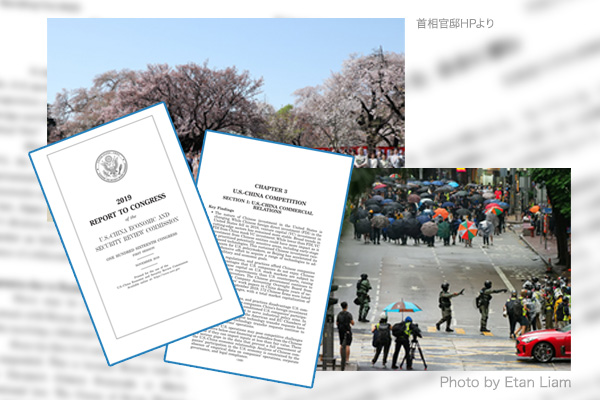Japanese Prime Minister Shinzo Abe decided to cancel his cherry-blossom party next year, after being criticized for having invited many of his political supporters to the publicly funded annual event. “Now that the prime minister has admitted his fault, we will thoroughly inquire into his responsibility,” said Jun Azumi, chairman of the Diet Affairs Committee of the Constitutional Democratic Party of Japan, the largest opposition group. The opposition parties have demanded that the two chambers of the National Diet hold budget committee meetings to deliberate the matter in the presence of the prime minister. Media organizations have spent massive time and newspaper spaces to report the matter.
If we closely watch growing East Asian tensions, however, especially the way the U.S. Congress and China have addressed Hong Kong police’s intensifying crackdown on pro-democracy protests, we can find how low the level of discussion in Japan on the cherry-blossom party is.
Growing concerns about armed intervention in Hong Kong
On October 15, the U.S. House of Representatives unanimously passed a bipartisan bill titled the Hong Kong Human Rights and Democracy Act of 2019, which would require the State Department to annually verify whether China complies with the principle of “one state, two systems” securing Hong Kong’s high-level autonomy. A similar bill passed the Senate on November 19. China has angrily reacted to the move, vowing to take a countermeasure.
On November 14, the U.S.-China Economic and Security Review Commission, a bipartisan advisory body of the U.S. Congress, released an annual report recommending that “Congress enact legislation stating that … the special status of Hong Kong [for U.S. preferential treatment] … will be suspended in the event that China’s government deploys People’s Liberation Army or People’s Armed Police forces to engage in armed intervention in Hong Kong.” Regarding Taiwan, the report urges the Congress to direct the Department of Defense to prepare a study that would provide the basis for a 15-year plan of action aimed at deterring Beijing from making a military attempt to unify Taiwan with China. It also encourages the Congress to enact legislation for increasing military exchanges and training with Taiwan.
The Group of Seven Western industrial democracies at an annual summit in August issued a statement calling for violence to be avoided to counter Hong Kong citizens’ large-scale protest rallies.
China indicates subduing Hong Kong protesters
Chinese President Xi Jinping, in Brazil for a BRICS summit of top leaders from Brazil, Russia, India, China and South Africa, indicated his intention to thoroughly crack down on the Hong Kong protests that he branded as a violent criminal act.
The Global Times, affiliated with the Chinese Communist Party’s organ People’s Daily, carried an article on November 13 headlined “To weaken police power is to help rioters,” signaling a forceful action to subdue the Hong Kong protests. For such action, China could deploy People’s Armed Police forces under the People’s Liberation Army that have been on standby in Shenzhen neighboring Hong Kong. On November 16, the Wall Street Journal reported PLA soldiers’ rare appearance outside barracks in Hong Kong to clear roadblocks and debris left by the protesters, saying it fueled speculation about the PLA’s future role in Hong Kong.
As we are limited in time, Japan’s National Diet should discuss now what Japan should do to protect human rights and democracy in Hong Kong and what message Japan should send internationally to deter China’s armed intervention in Hong Kong.
Fumio Ota is a senior fellow and a Planning Committee member at the Japan Institute for National Fundamentals. He is a retired Vice Admiral of Japan’s Maritime Self-Defense Force.


